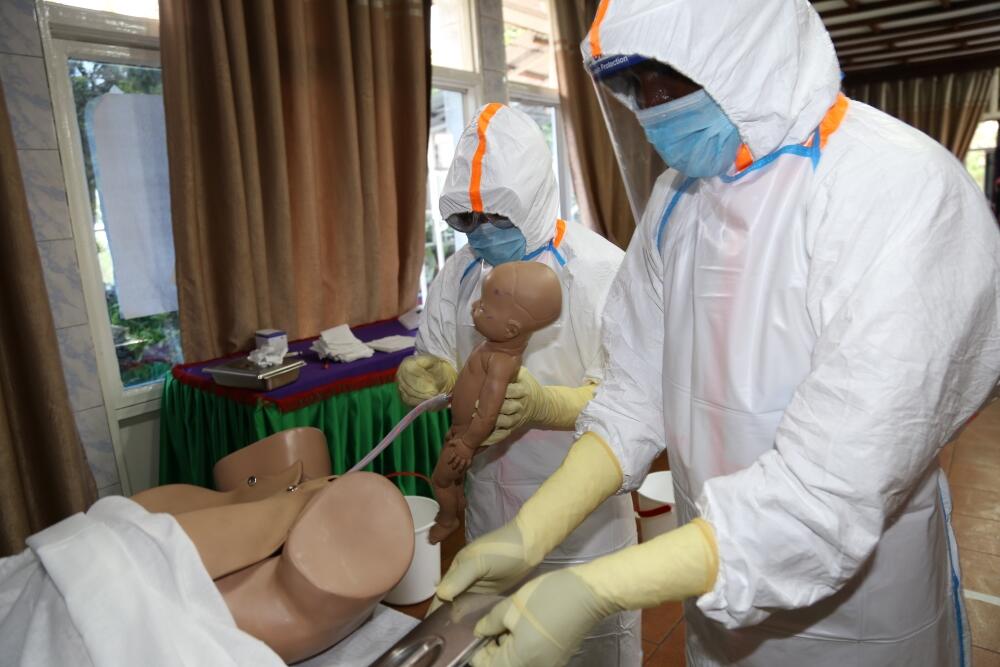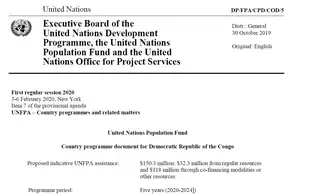NORTH KIVU AND ITURI PROVINCES, Democratic Republic of the Congo—UNFPA, the United Nations Population Fund and the Government of the Democratic Republic of the Congo are using an innovative approach to reduce the heavy toll that the Ebola virus has taken on health workers, while caring for infected patients in the high-risk settings of maternity wards and reproductive health services. This targets about 400 midwives in 300 health facilities in the two high-risk provinces of North Kivu and Ituri.
"The Ebola Virus epidemic is not sparing anyone,” said Professor Steve Ahuka, General Coordinator of the Ebola response. “Pregnant and breastfeeding women as well as health personnel operating in maternity wards, need protection and UNFPA’s activities are helping to achieve this.”

protocol of a maternity unit at risk of Ebola virus disease.
© UNFPA DRC
Since the government declared the tenth Ebola Viral Disease epidemic in August 2018, the Ministry of Health has recorded 3,427 cases, of which 3,304 were confirmed positive. As at 31 January, 1,148 people have been declared medically cured.
More than 5 per cent of those who have died of Ebola Virus Disease (EVD) in the country were health workers who developed the disease after being in contact with a patient’s bodily fluids. To break this chain of transmission, UNFPA, in partnership with WHO and the Ministry of Public Health, is working to strengthen infection prevention and control in health facilities in the Ebola-affected areas.
This is in response to growing evidence that health staff are at high risk of contracting the virus due to the biological fluids they are exposed to while providing reproductive and maternal health-care services, ranging from gynaecological consultations to the management of waste after childbirth.
“Ensuring compliance with infection prevention and control measures in maternity hospitals is an effective strategy that contributes to the efforts of the national coordination team to break the chain of transmission of this terrible disease," Professor Ahuka said.
Reducing risk to life while helping to give life
A detailed analysis has shown that the needs of women and children were not adequately addressed in the country’s first three strategic response plans to the disease. In this fourth strategy, the focus on infection prevention and control (IPC) in reproductive health services and maternity wards is an innovative approach.
The partnership between UNFPA and the ministry targets around 400 midwives in more than 300 health facilities in high-risk areas. Midwifery supervisors have been identified, trained and deployed to reinforce IPC measures at maternity wards in the two provinces of North Kivu and Ituri. Training modules have been specifically developed and made available to midwives and skilled birth attendants operating in areas of risk.
“Obstetric care and more specifically, childbirth, an act of giving new life, carry a very high risk of contamination with the virus through biological fluids,” said Dr. Monique Kapamba, National Reproductive Health Programme Manager, who leads the team of trainers hired by UNFPA to build the capacity of medical staff in the Ebola-affected areas.
“In maternity wards, pregnant women and newborns are potential vectors of EVD due to their compromised immune systems. Therefore, it is urgent and important to strengthen preventive measures in maternity hospitals located in risk areas,” she said.
In gynaecological and obstetric environments, such as the installation of isolation spaces, compliance with standard IPC measures, and compliance with IPC standards during childbirth, are essential measures to break the disease’s chain of transmission. “The supervision of IPC activities in maternity wards is crucial for implementation of the IPC complete minimum standards package, while also maintaining IPC performance within gynecological-obstetric environments,” Dr. Kapamba said.
UNFPA focuses on maternal health to save lives

the DRC, briefs medical doctors, gynaecologists, midwives and birth
attendants on infection prevention and control in Butembo, in October
2019. © UNFPA DRC
UNFPA together with the Ministry of Health and the Ebola response coordination team are working together to meet the objectives of eliminating preventable maternal deaths and towards zero transmission of Ebola in reproductive health services and maternity wards. This means ensuring that every health-care provider is able to apply all standard preventive measures against any form of Ebola contamination during prenatal consultations, labour surveillance, childbirth, post-natal care and waste management in maternity wards.
A critical and lifesaving intervention is the training of health personnel on stringent Ebola preventive measures while assisting pregnant women and when conducting deliveries, including obstetric complications and family planning services. UNFPA builds the capacity of midwives and skilled birth attendants in this respect, and deploys IPC focal points and supervisors in the health zones.
"This training of medical doctors, gynaecologists, midwives and birth attendants is the materialization of UNFPA's commitment to support implementation of the current national strategic response plan against EVD,” said Dr Polycarpe Takou, UNFPA Humanitarian Coordinator for the DRC and UNFPA coordinator for the EVD response.
“The initiative aims to ensure that the application of preventive measures becomes a reflex and routine attitude developed by health personnel. That is why UNFPA has put in place a system of regular supervision of trained personnel to monitor changes in attitude. In addition to the training and related supervision, UNFPA provides maternity wards with essential equipment to ensure full implementation of the IPC measures and render them Ebola-free places. These initiatives are complementary to the rehabilitation and equipping of several maternity wards in the EVD hot spots of Mangina, Beni and Katwa.”
Supervision by peers: an effective approach
Since October last year, teams of midwifery supervisors have toured the Ebola high-risk health zones of Ituri and North Kivu. Recruited by UNFPA, they are mandated by the Ministry of Health to supervise deliveries in maternity hospitals and other health centres to ensure that their peers are not at risk of Ebola infection.
UNFPA’s aim in deploying these peer supervisors is to ensure that IPC standard measures are implemented in some 300 health facilities identified at risk in the two provinces. This approach will help prevent the rapid progression of the disease and block the chain of transmission at the level of gynaecological and obstetrical services.
It will also help ensure that every provider is able to apply norms and preventive measures against all forms of Ebola contamination during prenatal consultations, labour surveillance, childbirth, post-natal care and waste management in maternity wards.
UNFPA’s lifesaving initiative has been commended by health staff who are benefitting from it. The work of the maternity supervisors is valued by the peer midwives, birth attendants and maternity ward aids they mentor on implementation of standard and additional IPC precautions in obstetrical settings. The supervisors also help them to develop plans to improve IPC in their respective maternity settings.
- Theophane Patinvoh





